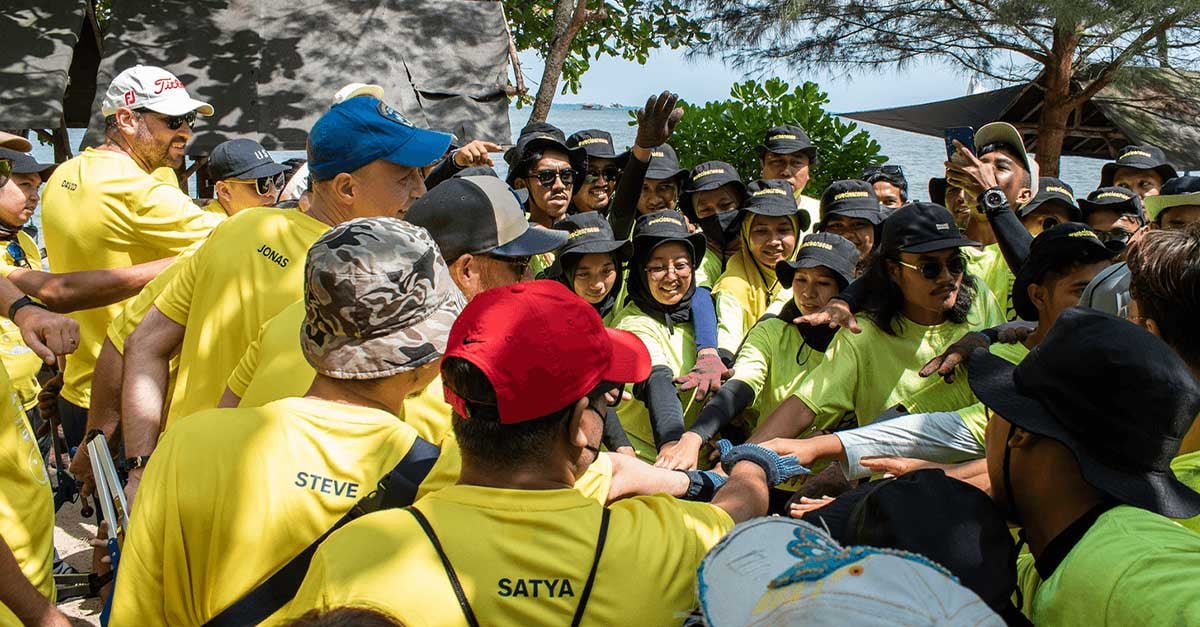Indonesian Ocean Plastic Removal Event
ESG Sustainability

ESG Sustainability
Brunel’s Singapore team got hands-on in the fight against ocean plastics earlier this month, rolling up their sleeves to take part in a clean-up on Indonesia's Riau Archipelago alongside eco-agency Seven Clean Seas.
Close to 70 committed Brunellers took part in the clean-up mission which succeeded in recovering a hefty 886kg of waste from a Bintan Island beach, before following it to Seven Clean Seas' nearby materials sorting facility to learn how the organisation is processing and recycling plastic waste. There the Brunel team helped to sort, clean, bundle and compress PET plastics – while learning about how these materials can be reused, some of the factors which can spoil otherwise recyclable plastics, and witnessing some innovative ideas for upcycling hard plastics into new items.

Even though waste collection is sometimes an unpleasant job, the Brunel team embraced the task at hand with smiles and enthusiasm, taking advantage of the opportunity to learn from Seven Clean Seas’ local collection staff who carry out such clean-ups on a weekly basis. Their insights were equal parts inspiring and horrifying.

The sometime idyllic island of Bintan sits within a marine protected area which is home to sea turtles, horseshoe crabs, dugongs and dolphins – but it also suffers as the repository for an appalling amount of waste material which washes ashore from both near and far away. Refuse regularly removed from the area includes a variety of plastics and general waste ranging from bottles, straws, plastic bags, food wrappers, cigarette butts and styrofoam to diapers, clothing and fishing rope.
Sadly, Indonesia has the world’s third highest amount of ocean plastics – estimated at around 56.3 million kg – which places the island nation behind only India (126.5 million kg) and China (70.7 million kg) despite being home to a population which is only a fraction of their respective sizes.





The Singapore team chose to undertake the joint Bintan Island clean-up as the organisation’s first major post-Covid team activity in order to align with Brunel’s global ESG commitment to combating environmental pollution, and ocean waste in particular. In 2018 Brunel's global leadership team endorsed a worldwide strategy to support actively reducing the amount of plastic in the world's oceans. Since then the organisation has incorporated that goal into the dedicated Brunel Foundation and has coordinated a range of local and global clean-up activities such as the Trash ‘n Trace initiative.
Seven Clean Seas has been actively coordinating ocean clean-ups throughout Indonesia and several other highly plastic-contaminated locations since 2018. They use local teams to systematically remove and process waste plastics from both oceans and rivers, and to date have removed over 500,000 kg of plastic waste from the world’s waterways – an impressive start on the 10 million kgs they have pledged to remove by 2025.
Brunel Managing Director – Asia, Jon Proctor remarked that while the event was well-received by his team, it was also confronting.
The experience was really eye-opening. We were genuinely shocked by just how much plastic waste is washing up on these beaches and it definitely made us stop and question exactly where some of our waste and the waste which arises through our supply chains – both as individuals and as a business – finishes up.
Jon Proctor
Brunel Managing Director – Asia
“While a place like Bintan Island may feel worlds away from Singapore, the reality is that it is only an hour by ferry, and though we don’t think about these places as being connected, the ocean carries floating plastic waste a long way and regardless of where that may be, it is almost certainly forgotten by those disposing of it by the time it washes up on a beach."
“Ultimately, what I think the whole team will take away from this activity, is that as both individuals and a society, we need to keep taking steps forward to reduce the amount of single-use plastics we’re consuming and that we cannot be complacent when it comes time to dispose of plastic waste. On the flip side, I think we can also see the tremendous potential for change possible when people make a concerted effort to correct problems like this – and though it may not always be easy, it is possible for all of us actively contribute to making our world and environment a better place.”